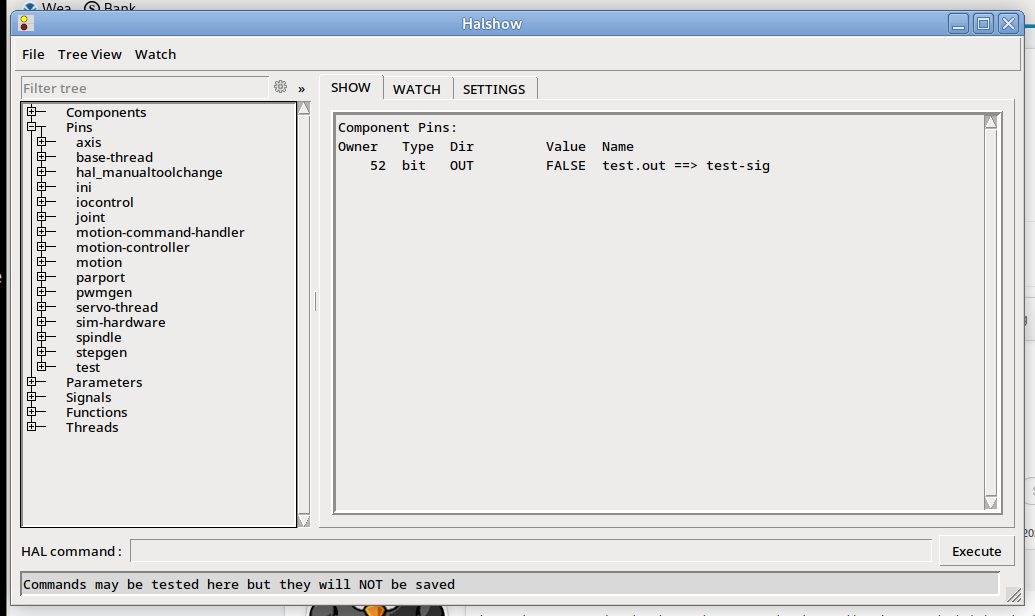Connect PyQt Button to HAL
- JT
-
 Topic Author
Topic Author
- Online
- Administrator
-

Less
More
- Posts: 1066
- Thank you received: 551
10 Feb 2024 12:26 #292986
by JT
Connect PyQt Button to HAL was created by JT
I'm a bit stumped on how to connect a PyQt button clicked signal to a HAL pin.
I can create a HAL pin and see it in showhal.
After a lot of grepping in src/emc/usr_intf I'm still at a loss how to connect the hal component to the clicked signal of a QPushButton.
After creating the hal component do you need to install it?
JT
I can create a HAL pin and see it in showhal.
parent.hal_test = hal.component('test')
parent.hal_test.newpin('out', hal.HAL_BIT, hal.HAL_OUT)
parent.hal_test.ready()After a lot of grepping in src/emc/usr_intf I'm still at a loss how to connect the hal component to the clicked signal of a QPushButton.
After creating the hal component do you need to install it?
JT
Please Log in or Create an account to join the conversation.
- JT
-
 Topic Author
Topic Author
- Online
- Administrator
-

Less
More
- Posts: 1066
- Thank you received: 551
10 Feb 2024 13:28 #292991
by JT
Replied by JT on topic Connect PyQt Button to HAL
Attachments:
The following user(s) said Thank You: tommylight
Please Log in or Create an account to join the conversation.
- cmorley
- Away
- Moderator
-

Less
More
- Posts: 7289
- Thank you received: 2127
10 Feb 2024 20:50 #293038
by cmorley
Replied by cmorley on topic Connect PyQt Button to HAL
How are you defining the clicked signal? from designer? in code?
Can you post your sample code for reference?
usually something like this:
button.clicked.connect(my_function)
def my_function(state):
print(state)
if state:
parent.hal_test.out.set(10)
else:
parent.hal_test.out.set(0)
Can you post your sample code for reference?
usually something like this:
button.clicked.connect(my_function)
def my_function(state):
print(state)
if state:
parent.hal_test.out.set(10)
else:
parent.hal_test.out.set(0)
The following user(s) said Thank You: JT
Please Log in or Create an account to join the conversation.
- JT
-
 Topic Author
Topic Author
- Online
- Administrator
-

Less
More
- Posts: 1066
- Thank you received: 551
10 Feb 2024 23:47 #293046
by JT
Replied by JT on topic Connect PyQt Button to HAL
Hi Chris,
I'm trying to connect a PyQt native signal from a QPushButton like clicked, pressed etc and have that set a HAL pin.
I "think" you have given me enough clues to try and make this work. I'll give it a whirl in the morning.
Thanks
JT
I'm trying to connect a PyQt native signal from a QPushButton like clicked, pressed etc and have that set a HAL pin.
I "think" you have given me enough clues to try and make this work. I'll give it a whirl in the morning.
Thanks
JT
Please Log in or Create an account to join the conversation.
- JT
-
 Topic Author
Topic Author
- Online
- Administrator
-

Less
More
- Posts: 1066
- Thank you received: 551
11 Feb 2024 12:28 #293084
by JT
Replied by JT on topic Connect PyQt Button to HAL
With some help from the IRC this is some code:
and a video
JT
#!/usr/bin/env python3
from PyQt6.QtWidgets import QApplication, QWidget, QVBoxLayout, QPushButton
from PyQt6.QtWidgets import QSpinBox
import hal, linuxcnc
'''
HAL_BIT
HAL_FLOAT
HAL_U32
HAL_S32
HAL_U64
HAL_S64
'''
class TestWidget(QWidget):
def __init__(self):
super().__init__()
self.halcomp = hal.component('mytest')
self.halcomp.newpin('out', hal.HAL_BIT, hal.HAL_OUT)
self.halcomp.newpin('in', hal.HAL_BIT, hal.HAL_IN)
self.halcomp.newpin('value', hal.HAL_U32, hal.HAL_IN)
self.halcomp.ready()
self.setWindowTitle('Test Widget')
self.setGeometry(300, 300, 250, 150)
self.layout = QVBoxLayout()
self.setLayout(self.layout)
self.test_out = QPushButton('Test Out')
self.test_out.setCheckable(True)
self.test_out.clicked.connect(self.set_out_pin)
self.test_in = QPushButton('Test In')
self.test_in.setCheckable(True)
self.test_in.clicked.connect(self.set_in_pin)
self.number_in = QSpinBox()
self.number_in.valueChanged.connect(lambda: hal.set_p('mytest.value', f'{self.number_in.value()}'))
self.layout.addWidget(self.test_out)
self.layout.addWidget(self.test_in)
self.layout.addWidget(self.number_in)
self.test_hal = QPushButton('Test HAL')
self.test_hal.clicked.connect(lambda: hal.set_p('halui.mode.teleop', "true"))
self.layout.addWidget(self.test_hal)
self.show()
def set_out_pin(self, data):
self.halcomp['out'] = data
def set_in_pin(self, data):
self.halcomp['in'] = data
def closeEvent(self, event):
event.accept()
self.halcomp.exit()
app = QApplication([])
w = TestWidget()
app.exec()and a video
JT
The following user(s) said Thank You: tommylight
Please Log in or Create an account to join the conversation.
- JT
-
 Topic Author
Topic Author
- Online
- Administrator
-

Less
More
- Posts: 1066
- Thank you received: 551
11 Feb 2024 13:16 #293088
by JT
Replied by JT on topic Connect PyQt Button to HAL
I tried this minimal example using your suggestion:
And I get this error:
If you don't have PyQt6 just use PyQt5 and change app.exec() to app.exec_().
Thanks for your time and help
JT
#!/usr/bin/env python3
from PyQt6.QtWidgets import QApplication, QWidget, QPushButton, QVBoxLayout
import hal
class test(QWidget):
def __init__(self):
super().__init__()
self.layout = QVBoxLayout()
self.setLayout(self.layout)
self.hal_test = hal.component('test')
self.hal_test.newpin('out', hal.HAL_BIT, hal.HAL_OUT)
self.hal_test.ready()
self.test_out = QPushButton('Test Out')
self.test_out.setCheckable(True)
self.test_out.clicked.connect(self.set_out_pin)
self.layout.addWidget(self.test_out)
self.show()
def set_out_pin(self, state):
print(state)
if state:
self.hal_test.out.set(10)
else:
self.hal_test.out.set(0)
def closeEvent(self, event):
event.accept()
self.hal_test.exit()
app = QApplication([])
x = test()
app.exec()And I get this error:
john@cave:~/github/hal$ ./hal_test_2.py
True
Traceback (most recent call last):
File "/home/john/github/hal/./hal_test_2.py", line 28, in set_out_pin
self.hal_test.out.set(10)
^^^^^^^^^^^^^^^^^^^^^
AttributeError: 'bool' object has no attribute 'set'
AbortedIf you don't have PyQt6 just use PyQt5 and change app.exec() to app.exec_().
Thanks for your time and help
JT
Please Log in or Create an account to join the conversation.
- JT
-
 Topic Author
Topic Author
- Online
- Administrator
-

Less
More
- Posts: 1066
- Thank you received: 551
11 Feb 2024 14:01 #293090
by JT
Replied by JT on topic Connect PyQt Button to HAL
This is working
Looks like the The HAL Python module docs are not correct...
JT
#!/usr/bin/env python3
from PyQt6.QtWidgets import QApplication, QWidget, QPushButton, QVBoxLayout
import hal
class test(QWidget):
def __init__(self):
super().__init__()
self.layout = QVBoxLayout()
self.setLayout(self.layout)
self.hal_test = hal.component('test')
self.hal_test.newpin('out', hal.HAL_BIT, hal.HAL_OUT)
self.hal_test.newpin('speed', hal.HAL_U32, hal.HAL_IN)
self.hal_test.ready()
print(f'test exists {hal.component_exists("test")}')
print(f'test ready {hal.component_is_ready("test")}')
hal.new_sig("out_signal",hal.HAL_BIT)
hal.connect('test.out','out_signal')
#print(f'Pin Dir {test.out.get_dir()}')
self.test_value = QPushButton('Test Value')
self.test_value.setCheckable(True)
self.test_value.clicked.connect(self.set_value)
self.layout.addWidget(self.test_value)
self.test_state = QPushButton('Test State')
self.test_state.setCheckable(True)
self.test_state.clicked.connect(self.set_state)
self.layout.addWidget(self.test_state)
self.show()
def set_value(self, state):
print(state)
if state:
self.hal_test['speed'] = 10
else:
self.hal_test['speed'] = 0
def set_state(self, state):
print(state)
if state:
self.hal_test['out'] = True
else:
self.hal_test['out'] = False
def closeEvent(self, event):
print('by by')
event.accept()
self.hal_test.exit()
app = QApplication([])
x = test()
app.exec()Looks like the The HAL Python module docs are not correct...
JT
The following user(s) said Thank You: Aciera
Please Log in or Create an account to join the conversation.
Time to create page: 0.097 seconds

